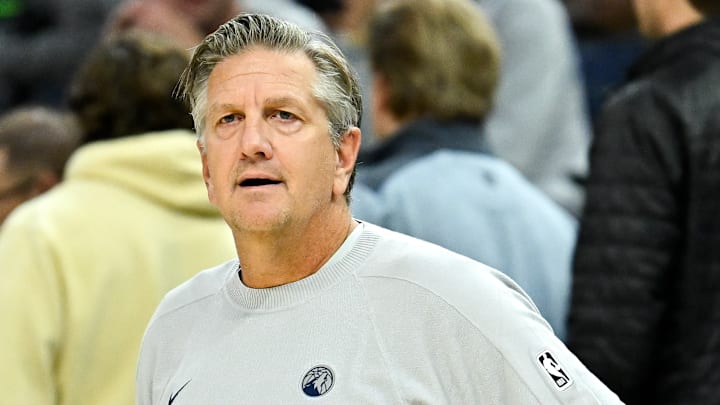Overacting to the NBA preseason is a dangerous game. Ultimately, it's a small sample size that means nothing in the long run. However, there can be some legitimate trends and takeaways, whether that be how fringe rotation/roster players perform or a concerning trend that is rearing its ugly head again.
Unfortunately for the Minnesota Timberwolves, one fear about their roster construction has already been confirmed. The Wolves' point guard room is a key concern with their roster. Likewise, the team's decision-making has plagued them in recent years.
In back-to-back preseason games, the Wolves have committed 20-plus turnovers, recording 23 turnovers against the New York Knicks on Thursday and 20 against the Indiana Pacers on Tuesday. Both games ended in overtime losses. For reference, the Utah Jazz's 17.2 turnovers were the most in the league last year.
Minnesota only recorded 11 turnovers in its preseason opener against the Denver Nuggets, but back-to-back 20-plus turnover games should be cause for concern given the makeup of this roster.
Turnover problems are nothing new for the Wolves
Last season, the Wolves ranked 18th in turnovers per game and 22nd in clutch-time turnovers. The year before, Minnesota ranked 22nd in turnovers per game. It was a concern that Wolves' decision-making issues could worsen without Nickeil Alexander-Walker, something that seems even more worrisome now.
Whether it's not being able to navigate double-teams, ill-advised passes, or simply getting the ball stripped, this Wolves squad has struggled to take care of the ball. Again, it's just two preseason games. However, these problems are similar to last year, and given the Wolves' roster construction, it's fair to say turnovers could be a real problem.
The Timberwolves' turnover problems are reflective of their roster construction
The Wolves lack a guard who can organize the offense outside of a soon-to-be 38-year-old Mike Conley. Granted, Conley didn't play against the Knicks. Still, he did against the Pacers, and simply looking at the roster construction, it's fair to believe this will be a key issue for the Timberwolves.
Rob Dillingham has some solid playmaking chops, but the 20-year-old is still trying to learn how to organize an NBA offense.
Anthony Edwards' main flaw has been playmaking, and it's unclear if that will change this season. He notably racked up three turnovers and no assists during Thursday's game. Throughout the game, Edwards struggled to make the right reads, especially when facing pressure, which has been a key problem for him.
Julius Randle is a skilled and versatile passer, but more of a point forward than a lead distributor. Even still, Randle himself has the occasional lapses in decision-making. Donte DiVincenzo is a solid connective playmaker but far from a lead guard. Naz Reid is a skilled passer for his size, but once again, he is not a lead decision-maker. Likewise, Jaden McDaniels has made strides as a playmaker but is mainly an off-ball threat.
Another key problem has been that Rudy Gobert's hands have seemingly gotten worse; in back-to-back games, he has recorded five turnovers. The Wolves hope to get Gobert more involved, but that will be difficult if he can't catch or control the ball.
Overall, while the Wolves have some talented playmakers, they don't have a trusted decision-maker (other than Conley) who can help avoid these mistakes. Plus, given Conley's age and declining abilities as a scorer, he seems destined for a lesser role.
While it's only two preseason games, it seems like the Wolves' lack of playmaking and poor decision-making could hurt the team. If this problem persists in the regular season, a trade could be on the horizon.
